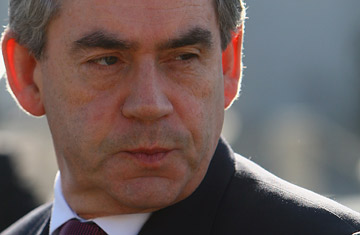
UK Prime Minister Gordon Brown
Hyperbole is never a stranger to politics, but jubilant members of the Scottish Nationalist Party claimed to have literally felt the earth move with their victory in the July 24 by-election in Glasgow East. The SNP dethroned Labour with a swing of more than 22%, a result "off the Richter Scale," said one SNP stalwart. The party's leader spoke of a "political earthquake."
Even one Labour MP called the outcome "seismic." Publicly he, like his party leaders, is putting a brave face on the result — voters tend to give governments a kicking at by-elections, and now they're blaming Labour for global economic mayhem. But privately, the MP admits he's scared. If a result such as this is possible in the once rock-solid Labour seat of Glasgow East, what horrors await him in his own constituency at the next general election — especially if Gordon Brown is still at the helm?
For once, talk of seismological upheavals may be apt. With every new reversal suffered by Labour come fresh questions about the Prime Minister's future. Ever since last fall, when he dithered over holding a snap election and then abandoned the idea, his popularity has been on a downward slide, both with the general public and within his own party. He doesn't have to face voters until 2010, since Tony Blair was only 25 months into a fresh five-year term when he handed over the reins to Brown last June. Brown now hopes to use the remainder of that term to stage a fightback.
What a fight it could be. The SNP have already wrested control of Scotland's own parliament away from Labour with a manifesto that calls for the country's eventual secession from the United Kingdom. If Scottish Nationalists were to achieve a swing of the magnitude of Glasgow East at the next general election, Labour would lose all but one of its 40 Scottish seats in Westminster. Brown himself, the MP for Kircaldy and Cowdenbeath near Edinburgh, would be among the casualties.
That would be disastrous enough for Labour. But in the rest of Britain the party faces an even bigger challenge from the Conservatives, who under David Cameron's charismatic leadership are consistently polling at least 15 points ahead of Labour in national opinion surveys and have triumphed in three successive electoral contests this summer. They defeated Labour in the London mayoral elections in May, installing Boris Johnson in City Hall, and followed that victory with two by-election wins, first in Henley, an affluent constituency west of London, and then in Crewe and Nantwich, a traditional Labour stronghold in the north of England.
"We're in a very good position, but we mustn't let it go to our heads," says Ed Vaizey, a member of the Conservative shadow cabinet. "This [Glasgow East result] can only put massive pressure on Gordon Brown's leadership."
Much of that pressure is building in Labour's own ranks. The party's coffers are empty, making it more reliant than ever on contributions from trade unions, which are using this leverage to try to push the party further to the left. Increasing numbers of moderate Labour MPs suspect that the only way to attract new donors and ultimately to avoid a swingeing defeat at the next general election is to replace Brown. Among the putative successors regularly mentioned are a clutch of Labour cabinet ministers: David Miliband, Alan Johnson, James Purnell and Ed Balls.
Party insiders also tip Jack Straw, now Justice Minister, a Labour veteran who has served as Foreign Secretary and Home Secretary, to play a key role. Labour rules make it tough to oust a Prime Minister. That's why some Labour MPs hope that Straw will persuade Brown to stand down voluntarily.
In desperation, they've been talking through different scenarios for an ouster and how Brown's departure could be explained to the electorate. On a rare sunny day this month, just before parliament rose for its long summer recess, MPs and party activists occupied every table at the riverside terrace bar of the House of Commons. The breeze was gentle, but their conversation was brutal. "Prime Ministers have been known to suffer health problems," mused one plotter.
As Brown counts the days until his planned holiday at the English seaside, he looks hale, if not hearty. But the latest by-election result really has triggered some violent tremors in Westminster. If the Prime Minister feels a touch under the weather, it's probably a bout of motion sickness.
